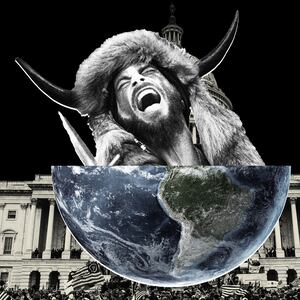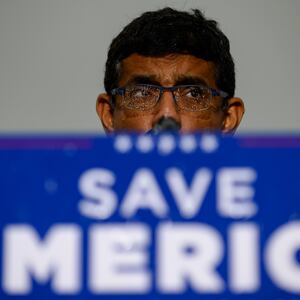The reports of the death of American democracy are, to paraphrase Mark Twain, exaggerated. Or, perhaps they are just premature. In any event, we should take some comfort from the fact that recent events suggest that when it comes to Lady Liberty, there still may be some life in the old girl yet.
You couldn’t be blamed for feeling pessimistic over the past years—which included assaults on voting rights, extreme cases of gerrymandering, the stealing of a Supreme Court seat, and an attempted coup. But here are four reasons to feel better about the prospects of the survival of our system of government.
First, as it turns out, some of the people we thought were the worst enemies of democracy had their limits. Even Bill Barr, Jared Kushner, Ivanka Trump, and reptilian Trump advisers like Jason Miller. That is not to say they were model citizens. They did an awesome amount of damage, but as the hearings of the House Select Committee on the Jan. 6 Attack on the Capitol have revealed, even people like these drew the line at overthrowing the government, stealing an election, and defrauding the American people.
That is not to say they deserve a medal for, finally, honoring their oath of office and respecting the Constitution. But it is comforting to know that there were many around Trump, including some dyed-in-the-wool right-wing extremists, who knew when to say enough. Take Trump’s former attorney general Bill Barr, who could still call “bullshit” when the former president offered lunatic conspiracy theories. Or former Trump campaign manager Bill Stepien, who understood that some of those advising the president were definitely on “Team Crazy.” (For example: Rudy Giuliani, Mike Flynn, the My Pillow guy, Peter Navarro, and a host of lawyers who behaved as though they got their degrees by filling in a law school advertisement they found inside a matchbook.)

Governments that rely on officials to all be wise and virtuous will never survive. This is, after all, the Planet Earth. That means governments must assume that from time to time individuals with bad motives will ultimately gain power. Our founders knew this. That is why they created checks and balances. That is why we supposedly are guided by the rule of law. But even those mechanisms can fail. In those moments, what we are left with is the character of those who hold office and our culture of democracy. Those may be imperfect, but they also can provide the final guardrail if fundamental ideas like respect for democracy endure among enough high-ranking officials—even if some of those officials are simply motivated by the fear that they might have to answer to the law.
In this case, it is clear that enough people made it hard enough for Trump to steal the election that his scheme could not work. People in the Justice Department, people in the Defense Department, and people in the White House—who all rejected the Big Lie, admitted the election was fair, and demanded an orderly transition of government. Even a vice president who did not know whether to do the right thing until the very end and who had gone along with all manner of abuses for four years—even he finally did the right thing because a few people around him advised him he had no other choice.
Our country nearly suffered a coup. But while we rightly focus on how extraordinary it is that we came so close, this week we were reminded that we should also focus on the fact that in the end, thanks to a wide variety of people doing something resembling the right thing (albeit grudgingly or for the wrong reasons), it did not happen.
Secondly, as the hearings have also demonstrated, a growing number of Republicans are willing to go on the record to challenge Donald Trump. They are doing this despite Trump’s continuing power within the party. They are doing this, as illustrated in the case of Republican former Philadelphia Commissioner Al Schmidt (who defied the Trump effort at illegally overturning election results), in spite of menacing threats to them and their families.

They do this—as in the case of Ivanka Trump, who acknowledged that Bill Barr was right and her father wrong about the outcome of the election—despite being the daughter of the former president.
Most notable among these voices of dissent within the GOP are Reps. Liz Cheney and Adam Kinzinger, who joined the Jan. 6 Committee despite the opposition of top GOP officials. It has cost Cheney her position in the GOP leadership and it may cost her her seat in Congress. Kinzinger decided to not even bother with a primary challenge and just retire. But it is apparent to all that the country owes them both a debt of gratitude because they did what was right, despite the costs, simply because it was what needed to be done.
Third, despite the deep divides in our political landscape, we have over the past year actually seen some areas in which some Republicans and Democrats are finding ways to work together in Congress. Last November, there was the bipartisan infrastructure bill. Now, we seem to be on the verge of gun safety legislation that will have bipartisan support in the Senate. Even Senate Minority Leader Mitch McConnell has said he might support the bill as it currently stands. Further, gun rights activists are indicating they think the legislation, while far from ideal, will make a real difference in an area where progress for years has been impossible.
Finally, the hearings are having some impact on public views. Even Fox News has decided to broadcast them live. Whether the coup plotters are ultimately held accountable by our judicial system remains one of the biggest unanswered tests of our democracy. But airing the facts of the plot to steal the election is moving the needle in the court of public opinion.

A recent Morning Consult/Politico poll showed that “most voters believe DOJ should take action against officials who attempted to overturn election results.” In the poll, two-thirds of voters held this view—including 86 percent of Democrats, 64 percent of independents, and about half of all Republicans. Nearly six in ten of those polled believe former President Trump is “very” or “somewhat” responsible for the events of Jan. 6. Finally, importantly, about half of all voters said the events of Jan. 6 would affect how they voted in November. The story is not a good one for those threatening democracy, and we are just in the early days of the hearings, so these findings are quite encouraging.
The threats against our system are grave. Active efforts to promote “the Big Lie” and steal elections continue. According to a Washington Post tally, “more than 100 GOP primary winners back Trump’s false fraud claims.” If they win in November—particularly those vying for state jobs that certify or decide election outcomes—free and fair elections might soon become a thing of the past in the U.S.
But the people will get to decide. And in the recent past, the majority of people have shown considerable wisdom. After all, Donald Trump lost the popular vote in the only two elections in which he ran. Further, I am hopeful Trump and those around him will ultimately be held accountable for their apparent crimes, even if we have yet to see the necessary action on that front from the Department of Justice.
Major developments could come—such as from Attorney General Merrick Garland’s team at Justice or, for example, from the grand jury in Fulton County, Georgia, looking into Trump’s efforts to intimidate Georgia officials into reversing 2020 election results. Either of these entities could send a strong message that our system, though damaged, is resilient and can survive this period of relentless attack on our most fundamental rights.
I am also hopeful that the courage of Cheney and Kinzinger may breathe some life into a remade post-Trumpian GOP—even if we are a long way from that hopeful future.
Finally, the Jan. 6 hearings, well-managed and competently produced to date, do seem to be making a difference. So while we must remain vigilant, and combat threats to democracy where we see them, we should also stop to note that there are genuine signs of hope that we might make it through this dark chapter in our history with our system of government—and at least some of its most important ideals—intact.








